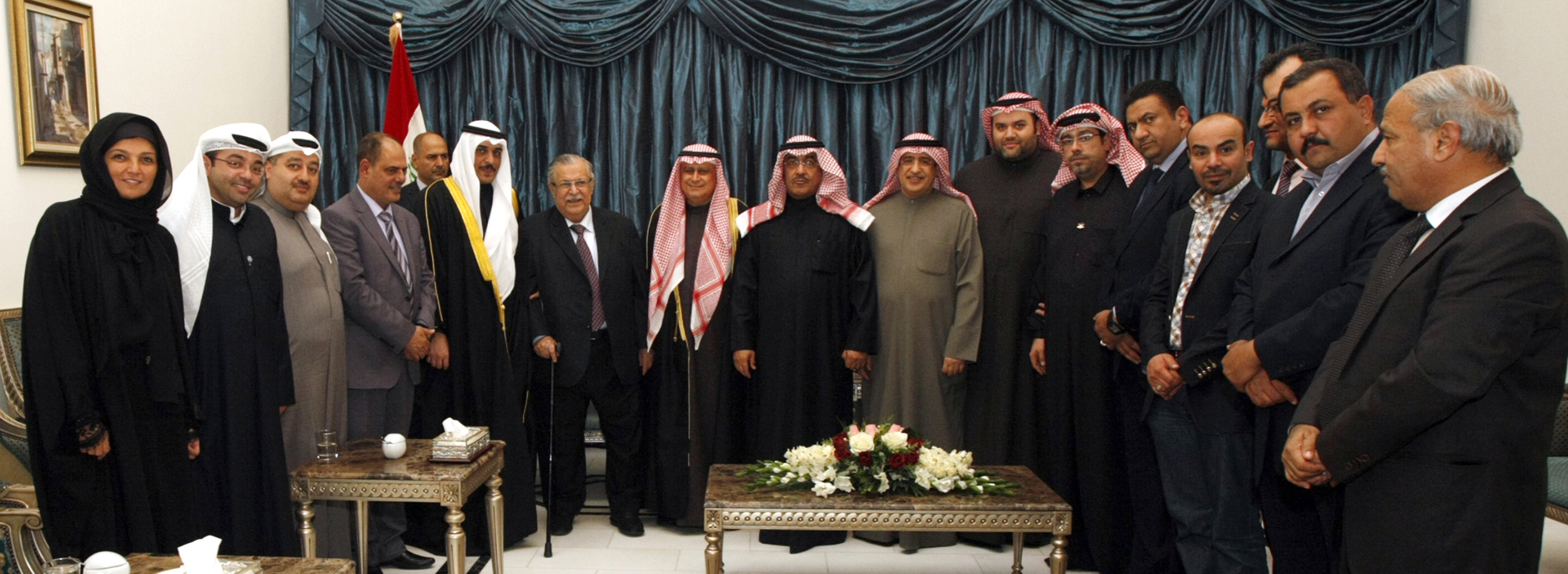LOC18:18
15:18 GMT

By Mohammad Al-Ghazzi (with photos)
BAGHDAD, Dec 8 (KUNA) -- Iraqi President Jalal Talabani said that all the
components for excellent relations with Kuwait, which he fully supports, are
there, and that the strained history between both is a result of the ex-Iraqi
President Saddam Hussein, "who fought his people and destroyed his country
before deciding to do the same to Kuwait."
In an interview with a delegation of visiting senior Kuwaiti journalists,
led by Kuwait Journalists Association chief Ahmad Behbehani, the president
said "I would like to stress that our relations with Kuwait are brotherly and
we are stern advocates of improving this relationship."
He hoped that the incident (Iraq's 1990 invasion of Kuwait) was water under
the bridge now, a lesson to be learnt from and something that should not come
in between the improvement of relations. "We are two powerful nations who can
complete each other," he said.
He hailed an upcoming visit of HH the Prime Minister of Kuwait Sheikh Jaber
Al-Mubarak Al-Sabah and described HH the Amir Sheikh Sabah Al-Ahmad Al-Jaber
Al-Sabah as a man who shares his own vision aimed at "improving relations
between both countries."
On UN chief Ban Ki-moon's visit to Baghdad to discuss Iraq's post-Gulf War
obligations to Kuwait, he said Ban had stressed the need for these issues to
be addressed and for Iraq to remove itself from the Security Council's seventh
article of sanctions.
"We (Iraq) are totally committed to ending these pending issues and to end
any misunderstandings as a result. We are ready to carry out what Kuwaiti
officials are demanding, formally, practically and on the ground," he said.
On Iraq's relations with neighbours, Turkey, he said the latter should
consider improving ties as Ankara has huge commercial interests, of over 1,000
companies, operating in Iraq.
On Syria, he described the current turmoil as "complex and complicated," as
the country is one of mixed communities. "On the one hand we have the
Alawites, who fully support the current government and whose fate is
intertwined with the regime's survival. If the regime falls they fear that all
of their privileges will fall in turn.
"We have the Druze, who include those who support and those who oppose the
government. As for the Kurds, most are with the government as they fear
Turkey's dominance in the region, which could affect their status. And, on the
other hand, we have Arab Sunnis, who are a majority in the country, all of
whom oppose the rule (of Bashar Al-Assad)."
He expressed the view that "the Al-Assad regime will not fall down, despite
its current weakness."
He also said that Kurds within Syria had requested arms support from Iraq,
but Iraq had rejected this on grounds that "we do not encourage armed
conflict. We affirmed to them that they should be carrying out their struggle
in a peaceful, legal and democratic manner.
He feared that civil war could drag on "if political groups do not reach a
peaceful solution to the issue, because the government cannot crush the
opposition and vice versa, therefore the conflict will continue."
On Kurdistan's relations with the central Iraqi government, he said that it
was "impossible for Kurdistan to be independent from Iraq."
"As a political party chief (Patriotic Union of Kurdistan) my motto since
day one called for the right for self determination. And when we voted for the
constitution we, in fact, exercised our right for self determination as a
federal union."
Around 95pct of Iraq's Kurdish minority voted in favour of the
constitution, which is a united federal one, he added.
"To all radical Kurds I say this, if Kurdistan were to announce is
independence and Turkey, Iran or Iraq were to seldomly announce the closure of
their borders, what then? In simple terms, we would suffocate. All necessary
economic and infrastructure needs are unavailable.
"At the moment, we have a democratic system, basic rights and wide
freedoms. This is a huge development as the situation is a good one. Living
standards are good and there are massive widespread construction projects
being carried out," he said.
He also said they were plans to reduce Iraq's role in the Arab region,
which accuse Iraq of acting as a subordinate of Iran.
"Despite Iraq's dominant Shiite majority, they do not accept playing second
fiddle to Iraq, as they view themselves as the foundation of the Shiite faith.
The Holy Najaf is is the Vatican of the Shiites, not (Iran's main Shiite holy
shrine) Qom," he concluded.
The president was interviewed by chief editors of Kuwaiti newspapers and
other written media, including Kuwait News Agency chief Rashid Al-Rowaishid,
newspapers Al-Anbaa, Yousif Al-Marzoug, Annahar, Imad Bukhamseen, Al-Rai,
Majid Al-Ali, Kuwait Times, Abdulrahman Al-Olayan, Deputy Editor-in-Chief of
Al Yaqaza magazine, Dalia Behbehani and Kuwait Journalists Association
President Ahmad Behbehani and its Director and chief organiser of the trip
Anan Al-Rashid. (end)
mhg.sd
KUNA 081818 Dec 12NNNN